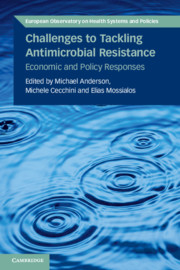Challenges to Tackling Antimicrobial Resistance
Antimicrobial resistance (AMR) is a biological mechanism whereby a microorganism evolves over time to develop the ability to become resistant to antimicrobial therapies such as antibiotics. The drivers of and potential solutions to AMR are complex, often spanning multiple sectors. The internationally recognized response to AMR advocates for a ‘One Health’ approach, which requires policies to be developed and implemented across human, animal, and environmental health. To date, misaligned economic incentives have slowed the development of novel antimicrobials and limited efforts to reduce antimicrobial usage. However, the research which underpins the variety of policy options to tackle AMR is rapidly evolving across multiple disciplines such as human medicine, veterinary medicine, agricultural sciences, epidemiology, economics, sociology and psychology. By bringing together in one place the latest evidence and analysing the different facets of the complex problem of tackling AMR, this book offers an accessible summary for policy-makers, academics and students on the big questions around AMR policy.
This title is also available as Open Access on Cambridge Core.
Michael Anderson is a Research Officer in Health Policy at the Department of Health Policy, London School of Economics and Political Science, and a Medical Doctor undertaking General Practice specialty training.
Michele Cecchini is a Senior Health Economist, Health Division, in the Directorate for Employment, Labour and Social Affairs, Organisation for Economic Co-operation and Development.
Elias Mossialos is Brian Abel-Smith Professor of Health Policy, Head of the Department of Health Policy at the London School of Economics and Political Science, and Co-Director of the European Observatory on Health Systems.



